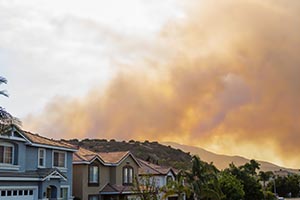A natural disaster can affect you both emotionally and financially. Here are tips and resources to help you regain control of your financial situation after a crisis.
In the aftermath of a natural disaster, it’s normal to feel confused and unsure about your financial situation. You may be wondering how to pay your bills, start the insurance process and get the funding you need. The following checklist helps you navigate these tough questions and stay on track for a smooth financial recovery.
Financial
- Halt unnecessary expenses: If your home is damaged or destroyed, call your utility and service companies to stop billing. Also, contact your creditors to extend your payment period until your situation is under control. Most creditors will try to be accommodating.
- Check with your lenders about deferments: Mortgages, institutional loans and vehicle loans can often be deferred or suspended during a crisis. Contact your lenders as soon as possible.
- Think about your emergency fund: How much savings do you have? What is your monthly income? Knowing your financial situation will help you prepare for unexpected costs like hotel rooms, repair supplies and transportation. Call your financial institution for specific guidance.
- Get cash to cover everyday expenses and help you rebuild: It’s critical you have access to money during this recovery period. If you lost credit cards, contact your credit card company to get replacements, and report any lost cards (credit and debit) to the card issuer right away. Consider these options if you need additional funds:
- Contact FEMA's disaster assistance for help and potential funding. Businesses and individuals may be eligible for low-interest disaster loans.
- Request an advance from your employer or ask if they offer programs to help after a disaster.
- Ask if your insurance company will pay for shelter, food or other expenses as you recover.
- Get help from family and friends in the form of wire transfers, gift cards or prepaid debit cards.
- Call your credit card company to ask about a cash advance. (But know that the interest rate may be very high.)
- Contact the Social Security office to ask for emergency funds.
- Inquire with your retirement plan administrator about withdrawing money. Tax restrictions may be changed to help in times of crisis.
- Gather or replace important documents: Locate critical documents like your driver’s license, birth certificate, passport, resident card and Social Security card. Replace any lost documents starting with your proof of identity (e.g., driver’s license or birth certificate.) Visit usa.gov to learn more.
- Take steps to prevent identity theft: You may be at risk for identity theft if you cannot locate important documents containing proof of your identity. Freeze or place a fraud alert on your credit by contacting one of the three credit bureaus: Equifax, Experian or TransUnion. Get a copy of your credit report online.
Insurance
- Contact your insurance company: Let them know exactly when, where and how the damage occurred.
- Describe the damage: Be as thorough as possible and include a list of lost or broken items.
- Document the situation: If you have damaged property, take photos, make a video and gather the original receipts if possible. Send everything to your insurance company for their records.
- Save receipts: Insurance may cover the cost of a temporary shelter, hotel, food, repair supplies and other expenses resulting from a natural disaster. Save receipts so you can get reimbursed.
- Make copies for tax purposes: Special tax provisions may help you save money after a disaster. If possible, make copies of your insurance claims and any important financial information.
Resources in your time of need
A disaster can upend your life in minutes, while leaving you to deal with devastating long-term consequences. Thankfully, you are not alone. The following organizations and resources provide valuable information to help after a hurricane, flood, tornado, fire or other disaster. They also offer assistance programs and low-interest loan options if you qualify.
- Red Cross: The American Red Cross provides comprehensive services to help you recover emotionally and financially after a disaster. Its wide network of relief workers responds to thousands of emergencies every year.
- FEMA: The Federal Emergency Management Agency (FEMA) works with Homeland Security to aid Americans during large-scale disasters, such as tornados, hurricanes, floods and terrorist attacks. FEMA has Disaster Recovery Centers located across the nation, where you can inquire about assistance programs and low-interest disaster loans.
- Disaster Assistance Improvement Program: Survivors can turn to the Disaster Assistance Improvement Program (DAIP) for information and relief services. You can find assistance programs, business administration loans and helpful information.
- Ready: Ready provides in-depth information to help you prepare for natural and man-made disasters. You can create a family emergency plan, build a supply kit and discover ways to take action in your community. Ready is offered in a variety of languages, including Spanish, Chinese, and Arabic
Have you encountered unexpected expenses after a natural disaster? Get some ideas for how to fit them into your budget.























